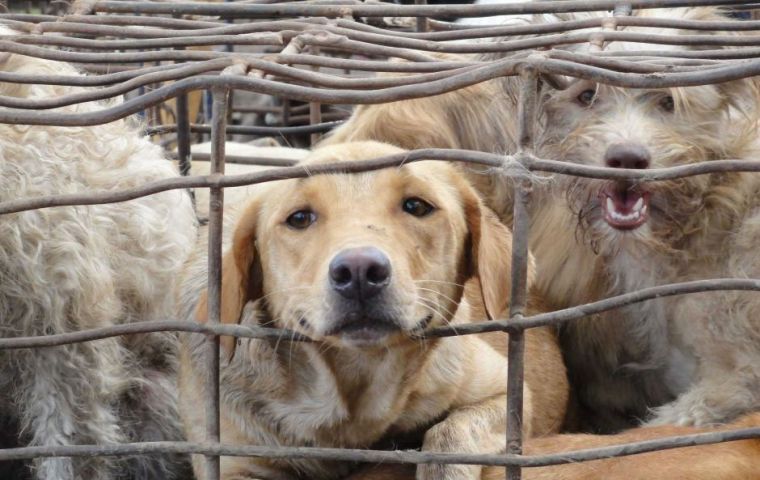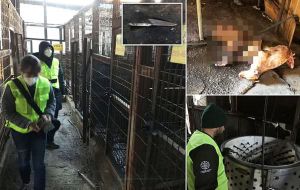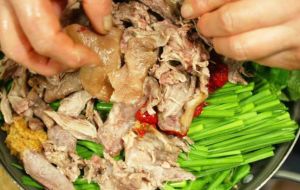MercoPress. South Atlantic News Agency
South Korea cracks down on canine slaughterhouses; dog meat considered a delicacy
 The Taepyeong-dong complex, an important source of meat for restaurants across the country, housed six slaughterhouses, holding several hundred animals at a time
The Taepyeong-dong complex, an important source of meat for restaurants across the country, housed six slaughterhouses, holding several hundred animals at a time  Humane Society International campaigners said conditions at the complex were “horrifying”. They reported seeing electrocution equipment used to slaughter dogs
Humane Society International campaigners said conditions at the complex were “horrifying”. They reported seeing electrocution equipment used to slaughter dogs  Every summer in South Korea three days are designated as special festivals, and dog meat dishes are served in a highly spiced stew
Every summer in South Korea three days are designated as special festivals, and dog meat dishes are served in a highly spiced stew  The number of dog meat restaurants has been falling in South Korea. Seoul once had 1,500 restaurants serving the dish, but this had dropped to about 700 by 2015
The number of dog meat restaurants has been falling in South Korea. Seoul once had 1,500 restaurants serving the dish, but this had dropped to about 700 by 2015 Officials in South Korea have started to dismantle the country's largest dog slaughterhouse. The Taepyeong-dong complex in Seongnam city, south of Seoul, will be cleared over two days and converted into a public park. About one million dogs are consumed every year and activists have sought to end the custom.
Dog meat was once considered a delicacy in South Korea, but attitudes have changed in recent years.
“This is a historic moment,” Korean Animal Rights Advocates (KARA) said in a statement. “It will open the door for more closures of dog meat slaughterhouses across the country, expediting the decline of the overall dog meat industry.”
The Taepyeong-dong complex - an important source of meat for restaurants across the country - housed at least six slaughterhouses, holding several hundred animals at a time.
Campaigners from Humane Society International (HSI) described conditions inside the complex as “horrifying”. They reported seeing electrocution equipment used to slaughter the dogs, knives and a de-hairing machine.
Nara Kim said: “It was a stain on the city of Seongnam and we are so pleased to see it bulldozed. This really feels like a landmark moment in the demise of the dog meat industry in South Korea, and sends the clear message that the dog meat industry is increasingly unwelcome in Korean society.”
Every summer in South Korea three days are designated as special festivals, and dog meat dishes are served in a highly spiced stew. However, a growing number of Koreans are opting for samgyetang (chicken soup) over the three days instead.
The number of dog meat restaurants has also been falling in South Korea. Seoul once had 1,500 restaurants serving the dish, but this had dropped to about 700 by 2015.
More and more South Koreans are also choosing to keep dogs as pets - roughly one-fifth of the population. Currently no laws exist on how to treat or slaughter canines for meat in the country. Western campaigners have in re cent years attempted to interfere with the dog meat trade by staging mass rescues.




Top Comments
Disclaimer & comment rulesCommenting for this story is now closed.
If you have a Facebook account, become a fan and comment on our Facebook Page!